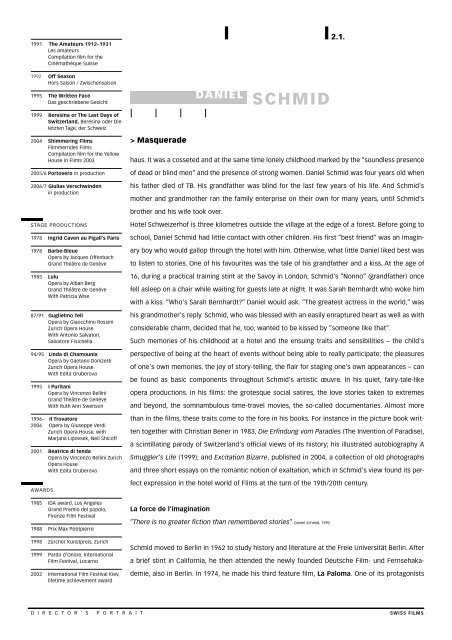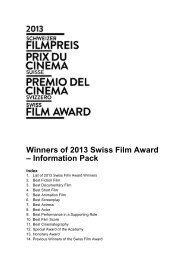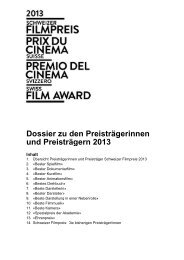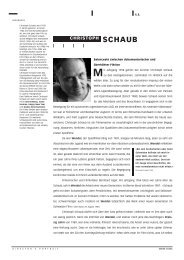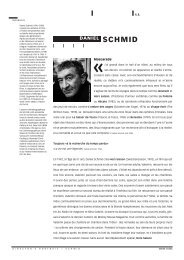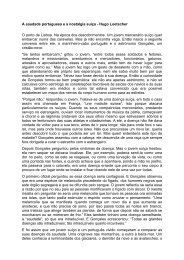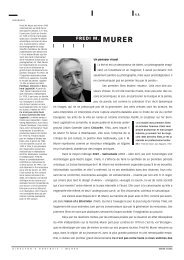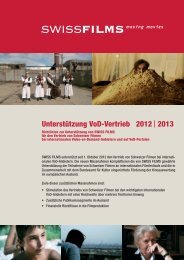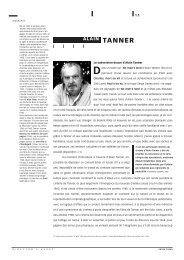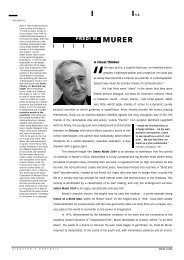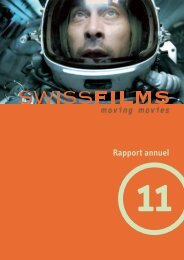Director's Portrait Daniel Schmid - Swiss Films
Director's Portrait Daniel Schmid - Swiss Films
Director's Portrait Daniel Schmid - Swiss Films
You also want an ePaper? Increase the reach of your titles
YUMPU automatically turns print PDFs into web optimized ePapers that Google loves.
1991 The Amateurs 1912–1931<br />
Les amateurs<br />
Compilation film for the<br />
Cinémathèque Suisse<br />
1992 Off Season<br />
Hors Saison / Zwischensaison<br />
1995 The Written Face<br />
Das geschriebene Gesicht<br />
1999 Beresina or The Last Days of<br />
Switzerland, Beresina oder Die<br />
letzten Tage, der Schweiz<br />
2004 Shimmering Flims<br />
Flimmerndes Flims<br />
Compilation film for the Yellow<br />
House in Flims 2003<br />
2005/6 Portovero in production<br />
2006/7 Giulias Verschwinden<br />
in production<br />
STAGE PRODUCTIONS<br />
1978 Ingrid Caven au Pigall’s Paris<br />
1978 Barbe-Bleue<br />
Opera by Jacques Offenbach<br />
Grand Théâtre de Genève<br />
1985 Lulu<br />
Opera by Alban Berg<br />
Grand Théâtre de Genève<br />
With Patricia Wise<br />
87/91 Guglielmo Tell<br />
Opera by Giaocchino Rossini<br />
Zurich Opera House<br />
With Antonio Salvatori,<br />
Salvatore Fisichella<br />
94/95 Linda di Chamounix<br />
Opera by Gaetano Donizetti<br />
Zurich Opera House<br />
With Edita Gruberova<br />
1995 I Puritani<br />
Opera by Vincenzo Bellini<br />
Grand Théâtre de Genève<br />
With Ruth Ann Swenson<br />
1996– Il Trovatore<br />
2006 Opera by Giuseppe Verdi<br />
Zurich Opera House, with<br />
Marjana Lipovsek, Neil Shicoff<br />
2001 Beatrice di tenda<br />
Opera by Vincenzo Bellini Zurich<br />
Opera House<br />
With Edita Gruberova<br />
AWARDS<br />
1985 IDA award, Los Angeles<br />
Grand Premio del popolo,<br />
Firenze Film Festival<br />
1988 Prix Max Petitpierre<br />
1998 Zürcher Kunstpreis, Zurich<br />
1999 Pardo d’Onore, International<br />
Film Festival, Locarno<br />
2002 International Film Festival Kiev,<br />
lifetime achievement award<br />
D I R E C T O R ’ S P O R T R A I T<br />
> Masquerade<br />
haus. It was a cosseted and at the same time lonely childhood marked by the “soundless presence<br />
of dead or blind men” and the presence of strong women. <strong>Daniel</strong> <strong>Schmid</strong> was four years old when<br />
his father died of TB. His grandfather was blind for the last few years of his life. And <strong>Schmid</strong>'s<br />
mother and grandmother ran the family enterprise on their own for many years, until <strong>Schmid</strong>'s<br />
brother and his wife took over.<br />
Hotel Schweizerhof is three kilometres outside the village at the edge of a forest. Before going to<br />
school, <strong>Daniel</strong> <strong>Schmid</strong> had little contact with other children. His first “best friend” was an imagin-<br />
ary boy who would gallop through the hotel with him. Otherwise, what little <strong>Daniel</strong> liked best was<br />
to listen to stories. One of his favourites was the tale of his grandfather and a kiss. At the age of<br />
16, during a practical training stint at the Savoy in London, <strong>Schmid</strong>'s “Nonno“ (grandfather) once<br />
fell asleep on a chair while waiting for guests late at night. It was Sarah Bernhardt who woke him<br />
with a kiss. ”Who's Sarah Bernhardt?” <strong>Daniel</strong> would ask. ”The greatest actress in the world,” was<br />
his grandmother's reply. <strong>Schmid</strong>, who was blessed with an easily enraptured heart as well as with<br />
considerable charm, decided that he, too, wanted to be kissed by ”someone like that”.<br />
Such memories of his childhood at a hotel and the ensuing traits and sensibilities – the child's<br />
perspective of being at the heart of events without being able to really participate; the pleasures<br />
of one's own memories, the joy of story-telling, the flair for staging one’s own appearances – can<br />
be found as basic components throughout <strong>Schmid</strong>'s artistic œuvre. In his quiet, fairy-tale-like<br />
opera productions. In his films: the grotesque social satires, the love stories taken to extremes<br />
and beyond, the somnambulous time-travel movies, the so-called documentaries. Almost more<br />
than in the films, these traits come to the fore in his books. For instance in the picture book writ-<br />
ten together with Christian Bener in 1983, Die Erfindung vom Paradies (The Invention of Paradise),<br />
a scintillating parody of Switzerland's official views of its history; his illustrated autobiography A<br />
Smuggler’s Life (1999); and Excitation Bizarre, published in 2004, a collection of old photographs<br />
and three short essays on the romantic notion of exaltation, which in <strong>Schmid</strong>'s view found its per-<br />
fect expression in the hotel world of Flims at the turn of the 19th/20th century.<br />
La force de l’imagination<br />
DANIEL SCHMID<br />
”There is no greater fiction than remembered stories” <strong>Daniel</strong> <strong>Schmid</strong>, 1992<br />
<strong>Schmid</strong> moved to Berlin in 1962 to study history and literature at the Freie Universität Berlin. After<br />
a brief stint in California, he then attended the newly founded Deutsche Film- und Fernsehaka-<br />
demie, also in Berlin. In 1974, he made his third feature film, La Paloma. One of its protagonists<br />
2.1.<br />
SWISS FILMS


